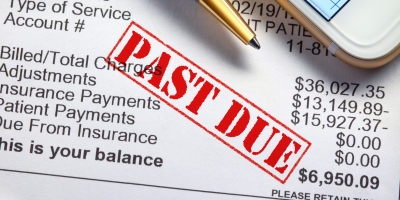Although there are probably an unlimited number of ways you can destroy your budget, I’ve decided to dedicate today’s post to just fifteen of the ones I deem to be the most effective.
Method 1: Underestimating the Power of ATM Fees
If you use your debit card on a regular basis and don’t pull cash out, then ATM fees might be the least of your worries. If on occasion, though, you need to pull cash out to get into an event or pay your child’s allowance, then it’s important to keep those pesky ATM fees in mind. While $3 might not seem like a lot, if you budget down to the dollar as I do, then that small amount can create a world of hurt by over drafting your account or leaving you without enough money in another area of the budget.
Tip: It might be time to find a bank that doesn’t charge ATM fees (or even reimburses them). We, personally, use USAA, but there are a lot of other banks out there that are now offering this as a service, so you might find it valuable to do a little research and find one that works for you. This one tweak can stop you from destroying your budget with minimal work!
Method 2: Paying For Subscription Services You Aren’t Using
This should seem fairly straightforward and yet, if you haven’t taken the time to check your bank account in detail, you might not realize how much you are spending on subscription services you don’t use. For example, do you have Netflix, Hulu, Cable, and Amazon Movies? If so, is there one that you don’t use much that you could cut back on? You might find that you save $10 to $50 by cutting one service.
Other subscription services might include unlimited car wash packages, things like Stitch Fix (you can always just cut back on frequency), an unused gym membership, and so many more. Take the time and look through your bank statements for items you pay for each month that you might not be using.
Method 3: Forget to Include Variable Expenses
That budget that you’ve worked so hard to create and maintain might become a struggle for you if you don’t account for the variable expenses that come throughout the year. More specifically, I’m talking about those car registration fees, yearly subscription renewals (if you are using them), school year expenses, and anything else that comes with the changing of seasons.
Spend a few minutes checking your budget and contemplating what might be missing. You certainly don’t want to have to put aside your grocery budget in order to put new tires on the car, do you?
Additional Resources:
Implement a Budget: Variable Expenses
School Year Budget Survival Tactics
How To Use a Savings Fund and Why You Absolutely Should
Method 4: Choose Not to Record EVERY Expense
I cannot stress it enough how critical it is to record and track each and every expense. You can do this in so many ways, including using a financial workbook (this one’s my favorite), or an online app or program, but it’s important to see exactly where your money is going.
It might seem easier to simply check the bank account and stop spending when the money runs out but, what if you still have two weeks left in the month and no groceries in the fridge? It’s happened to us before and I know, quite honestly, it was because we didn’t track our expenses. Not to mention, we always ended up with one payment that went through after we’d run out of money…which leads to a whole different set of issues.
Method 5: Miss Payments or Deal with Overdraft Fees
The first year we were married, without a doubt, every month we had some sort of late payment or overdraft fee. It wasn’t because we hadn’t paid the bill, necessarily, but because, as I mentioned above, we weren’t tracking where our money was going. So, I’d look at the bank account and notice that we still had a hundred dollars there, and we’d go spend it, forgetting that we still had an outstanding utility bill.
Most often, it would result in an overdraft fee somewhere in the range of $30, and then we’d spend the next month trying to overcome that obstacle. It was a vicious cycle that only ended once we started to track our expenses more closely.
Missed payments are another issue because, while it might alleviate the stress at the moment, paying double the next month or dealing with late fees can wreak more havoc than it’s worth. To the best of your ability, pay those bills on time no matter what.
Additional Resources:
How to Cope When Income Doesn’t Cover Necessities
Method 6: Not Make Grocery Lists and Meal Plan
Meal plans and grocery lists can make or break a budget. If you don’t meal plan, then you won’t shop for the things you need, which will likely result in purchasing more at the grocery store (due to not having a list) and then eating out when you have “nothing to eat” at home. It’s a dangerous game to play, especially when you are attempting to save money, pay off debt, or simply live a more fiscally responsible life.
Additional Resources:
Grocery Budget Survival: Strategies for Success
Method 7: Not Plan Ahead for Housing and Medical Expenses
While they could be categorized with Variable Expenses, I feel that housing and medical expenses are a whole different category. For one, while you can attempt to plan ahead for a variable expense that repeats itself year after year, housing and medical expenses are normally unplanned, and typically require more money.
Think back to the last time you received a large medical bill. Did you have to clear out your emergency savings? Pay for it with a credit card? Make a payment plan? What about when your pipe burst in the basement or the heater went out? How did you come up with the money to get your home back in order?
Tip: Keep unplanned medical and housing expenses from ruining your budget by setting aside a little money each month for both. It might not cover the entire expense if something major happens, but at least it will give you a good place to start.
Method 8: Make Frequent Grocery Trips
Much like not planning ahead for meals, frequent grocery store trips can destroy any budget (even mine!). Let’s think about it for a moment. Say you head out to the grocery store on Sunday to do your weekly shopping. Maybe you even took the grocery list and stuck to it, but you spent the amount of money budgeted for this week’s groceries.
Then, on Wednesday, your spouse heads to the grocery store because you need an onion for that evening’s meal. He comes home with two bottles of wine (you were out, right?), a candy bar, a box of brownies, and a few other items just in case. Suddenly, you’ve doubled your grocery bill for the week, just because you didn’t plan accordingly.
Tip: If at all possible, only grocery shop once per week and determine that you will stick to what you’ve purchased, even if you are missing an ingredient here or there. Not only will you save money by doing so, but it will force you to make more comprehensive meal plans and grocery lists in the future.
Method 9: Not Targeting Revolving Debt
It’s a controversial topic, the idea of debt payoff, and one that makes people nervous just to think about. Trust me, I know. The problem with not making more than a minimum payment on debt, though, is that you are paying so much in interest, especially when you have credit cards or other forms of revolving debt. Make an effort to pay those balances down (you can use my method HERE), and you will save yourself (and your budget) a lot of frustration in the future.
Method 10: Forgetting to Account for Life Changes
You can easily destroy any budget by forgetting to account for your life changes. Purchased a house? It’s time to plan for those repairs and ongoing maintenance expenses. Had a kid? Food, clothing, and medical expenses should be incorporated. Adopted a cat? Veterinarian bills, food, and toys should have a line item. Each month as you look over your budget, make sure to include any changes that have taken place so that you aren’t caught unaware mid-month.
Additional Resources:
How to Manage Pets and Your Budget
Method 11: Limited Communication with the Whole Family
Communicating with the whole family is a huge part of maintaining a successful budget. When every person is on the same page with regard to the goals the budget is set to achieve, and the methods being used to keep it effective, then each person will want to participate. Have a family budget meeting each month and discuss the progress being made, the plan going forward, and how each person can contribute to long-term success. It might be awkward at first, but it’s worth it.
Additional Resources:
Method 12: Not Prioritizing an Emergency Fund
Having an emergency fund doesn’t seem glamorous to most. I understand, because I thought the same thing when I started out and yet, we’ve found it to be quite the opposite. I always believed that an emergency fund wasn’t necessary because I had a credit card. When we started to pay down our credit cards, though, I found that no matter what we did, we always added more money for “emergencies”.
Now that we have an emergency fund in place, we haven’t had to place any additional money on our credit cards. They remain unused, and we are able to keep from paying interest as well. Does this mean we haven’t had emergencies? Absolutely not. We’ve actually had to drain the emergency fund on several occasions, but each and every time we’ve prioritized getting it fully funded again, and it has created so much less stress than having credit card debt.
Without an emergency fund, the goals you’ve set out to achieve with your finances will be a lot harder to reach.
Additional Resources:
Do You Need An Emergency Fund?
Method 13: Not Account for Spending
One of the biggest reasons I hear from people about why their budget fails comes down to a lack of spending. That may sound counterintuitive, but I promise it’s not. When you have spending money allocated for each person of the family they will be more likely to stick to the “rules” regarding the rest of the budget.
In our case, each of us has a set amount that we receive as spending money each month. We can choose to do with it what we want, whether that includes spending it or saving it for a future purchase, but that money isn’t under scrutiny from anyone else. It allows for flexibility, hobby maintenance, and a few cups of Starbucks coffee (my favorite!) here and there.
Do you have spending money set aside in your budget? If not, I highly recommend incorporating it because, while not spending might work in the short term, eventually everyone will get tired of feeling enslaved and restricted by the budget.
Method 14: Budgeting with No Purpose
Like anything in life, if you don’t have a purpose for your budget, you won’t stick with it. Finding a purpose for your budget shouldn’t be hard, though, and I’ve got a great guide for you to follow (you can find it HERE) if you are interested. Ultimately, you should have a goal you are working toward, whether that be debt payoff, saving for a large purchase, planning for retirement, or funding your child’s college. When you have that goal in place, you’ll be excited to make progress toward it.
Method 15: Choosing Not to Have a Budget At All
Honestly, the best way to keep destroying your budget is not to have one at all. It might seem to you like it’s more complicated to have a budget and frustrating to have to stick to it, but I promise you, it’s not true. Once you have a that carefully planned budget in place, you can feel confident in knowing exactly where your money is going and in what ways you need to make changes so that your family can live the best financial life possible.
Need help setting one up? I’ve got an entire guide HERE. If at all possible, don’t go another day without prioritizing your financial future.
Will You Fail or Succeed?
Is there something on the list above that you’ve yet to incorporate into your budget? These 15 expenses may seem small but added up, they can seriously be destroying your budget. Let me know below so we can cheer you on! Ultimately, it’s up to you to make that decision, though, in my experience, you won’t know what works until you try!
Tip: Reaching your financial goals starts with a budget. Grab my FREE Family Budget Workbook to help you get started today! Find it HERE.



